Spring 2020 – Archives
| Expand All | Collapse All |
| Department News |
ViewDigital History Lab Brings New Technologies to Faculty and Students
Last year, Business Manager Jennifer Parker and other department staff members conceived of a lab run by graduate students and recent graduates. Faculty and graduate students were immediately enthusiastic. “We’ve had a tremendous opportunity to build something pretty cool,” says Dr. Gabe Moss, a mapping specialist and DHL co-director. Moss and the two other co-directors, Dr. Garrett Wright and Emma Rothberg, encourage students and faculty to reach out for assistance, even if they are only in the early stages of a project. “Some of them have very clear ideas about what they want to implement or integrate into their classroom or research, and others don’t have specific ideas. Those tend to be brainstorming sessions,” explained Wright. “We talk about various tools you could use, and sometimes it’s simply a matter of putting you in touch with the right librarians or other people on campus.” The DHL co-directors also help professors approach assignments and assessments in new ways. In the fall, Wright worked with Dr. Jerma Jackson, who asked students in her History 385 class to create a wiki (a collaborative online encyclopedia) about African American women’s history for their final project. New DHL co-director and current graduate student Emma Rothberg is helping with an ongoing project with Dr. Katherine Turk’s course, History 179H: Women in the History of UNC-Chapel Hill. “They were creating an exhibit to go up in Wilson Library, and we approached Dr. Turk asking if she would let us take the information that the class had compiled and put it onto a walking tour,” Rothberg said. When the project is finished, users will be able to follow an interactive map to learn about women’s history at the university. Rothberg, Wright, and Moss all have previous digital humanities experience, and they bring their own expertise to the DHL’s training offerings. In October, Moss, an expert in ancient history, ran a mapmaking workshop that drew participants from across the university and the broader community. Indeed, while the DHL focuses on serving members of the Department of History, the co-directors also find ways to bring digital humanities to the public. Currently, Moss, Rothberg, and Wright are planning a “Teaching History in the Digital Age” conference for university, community college, and high school educators across the Triangle. They also host transcribe-a-thons, where participants help digitize historical records so that students, scholars, and genealogists around the world can more easily use them. So far, the DHL has hosted events to transcribe records from American soldiers in World War II, nineteenth-century antislavery manuscripts, and advertisements for escaped enslaved people. As instructors moved their classes online during the COVID-19 crisis, Moss, Rothberg, and Wright adapted the services they provide. Now, they host online office hours three times per week, providing support to faculty members who need to quickly learn how to integrate digital tools. For those looking to learn history while social distancing, the DHL co-directors host a podcast called The Lens. Their guests are Department of History professors and graduate students who discuss pop culture from a historian’s perspective. So far, episodes have ranged from military historian Dr. Wayne Lee discussing the award-winning film World War I film 1917 to medievalist graduate student Daniel Morgan analyzing the hit HBO series Game of Thrones. You can find recent episodes of The Lens online at https://digitalhistorylab.unc.edu/podcast/. For Rothberg, Moss, and Wright, the recent need to transition instruction and research online emphasizes the importance of digital humanities. “I think it is now a vital tool for historians—and I think that was true before we all got locked in our houses and had to figure out a way to work and teach,” Moss said. “There are so many cool things you can do when you combine the traditional standards and evidence and practices that historians do with processing power, with new technology, with a sort of open sharing of information.” History Department Meets COVID Crisis Head-On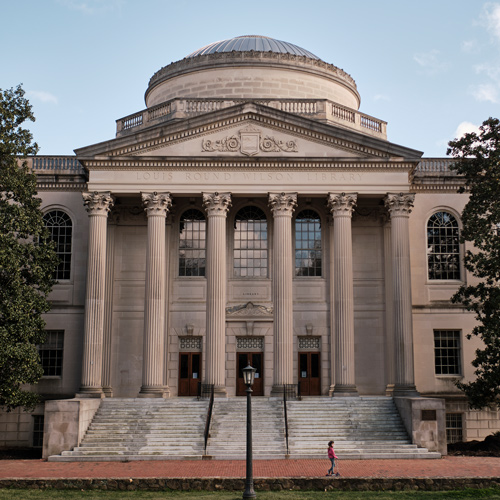 When Acting Chair Professor Benjamin Waterhouse received an email on March 13 from the university announcing the extension of Spring Break and a possible transition to virtual learning for the remainder of the semester, he and the other members of the department’s leadership were ready. The History Department’s Executive Committee—consisting of Associate Chair Professor Molly Worthen, Director of Undergraduate Studies Professor Brett Whalen, and Director of Graduate Studies Sarah Shields—had already formulated a plan to utilize the department’s existing online capabilities and resources to transition all courses online as quickly as possible. “I would stress the department came together without coming together,” Waterhouse recalls. “With very short notice, all of our instructors in a period of basically ten days successfully brought together their experience to find a way to finish the semester in a way that combined academic rigor with compassion for students experiencing unprecedented disruption in their lives.” Waterhouse, Whalen, and Worthen divided the instructional faculty into three “teams” to provide assistance to colleagues and coordinate best practices, such as use of the university’s virtual meeting platform, Zoom. In this effort they were aided by the significant in-house experience the department has accumulated over the past several years in online learning and digital humanities. Housed in the History Department, the UNC Digital History Lab is directed by three advanced PhD students, Gabriel Moss, Emma Rothberg, and Garrett Wright. Waterhouse effusively praises the leadership of these three scholars. “On very short notice they were very effective in reconfiguring the operations of the digital history lab to facilitate online learning and teaching.” Within a week and a half of the university’s announcement, instructors were implementing a wide range of strategies. “Some people used Zoom to give live lectures, some recorded and moderated discussion sections, while others changed the allocation of reading and class discussion. We broadly maintained the pedagogical integrity of the classes and kept students engaged,” Waterhouse adds. Director of Undergraduate Studies Whalen echoes the importance of the department’s existing digital capacities in smoothing the transition. “I would emphasize I’m pretty proud of how the department handled this whole thing. People jumped right in.” Whalen also makes a point of emphasizing the tremendous effort invested behind the scenes by the departmental staff, who had to make all the administrative and logistical affairs of the department “go virtual” practically overnight. As Whalen explains, this was no mean feat. “I was in the office the last day campus was open and was watching the office staff working and getting ready to make the transition themselves,” he recounts. “They were realizing they might not be in their offices for who knows how long. All I could think was: ‘You guys are amazing!’ I was practically getting misty eyed. The staff were just as important as the faculty in getting us through this experience.” For all the groundwork laid by faculty and staff for the “return” to classes after Spring Break, no amount of preparation could have prepared some of the department’s students for the disruption caused by the crisis. Virtually all teaching faculty found themselves trying to accommodate students faced with uncertain living situations, new childcare responsibilities, sudden unemployment and, in some cases, loss of friends and loved ones. “I got an email from a student in my large lecture course on medieval Europe who was from China,” Whalen recalls. “She was placed in a two-week quarantine as soon as he returned to the U.S., barely had wireless, no access to the Internet, and kept trying to get in touch with me on the phone.” Another faculty member, Professor Eren Tasar, describes a student in his HIST 398 research seminar who, after returning home to New England, found himself caring full time for his younger brother, a toddler. These and many other stories of hardship experienced by students underscore the importance of the flexibility and compassion displayed by department faculty this term. But as Waterhouse reminds colleagues, if there is one silver lining to the pandemic’s impact on university teaching, it is that the crisis has brought people together. This is true not only of faculty and staff, but also of some students. Professor Matthew Andrews, who posted his lectures online this term, explains that “I have received, literally, dozens of emails from students telling me that they sit down with siblings, parents, or grandparents and watch my lectures on Baseball and American History or my lectures on the Olympic Games.” For some students, the uncertainty of the times has allowed them to reconnect with family members. Andrews continues: “In the past, students have told me that they call their parents to talk about what they are learning in these course, sport being the lingua franca, and all that—and that these courses help them connect with family members in ways that had not previously been possible.” Andrews underscores a reality the entire departmental community—faculty, staff and students—is aware of: That the study of the past can hold profound lessons for the present, and in these times of unprecedented disruption, identifying our shared experiences can bring us all together. |
| Faculty Spotlight |
|
View
No items found
|
| Alumni Spotlight |
|
View
No items found
|
| History in Our World |
ViewDepartment Gives Space to Writer-Activists “Waging Peace in Vietnam”
During the first week of the exhibit’s residence in the History Department, two contributors spoke about their personal experiences and the ideas that led to the project. Carver, one of the book’s editors, explained how his early engagement in the Civil Rights movement led him to work with enlisted soldiers and veterans who opposed the war in Vietnam. Having traveled the country to register voters, organize sit-ins, and give voice to the disenfranchised, Carver pivoted to a new venue: coffee houses. For nearly three years, Carver and a group of colleagues founded cafes near stateside military bases, catering to soldiers who desperately needed safe spaces to relax and discuss their grievances in towns that were often devoid of any non-military life. To better understand soldiers, the brutality of the war, and its implications for Vietnamese civilians, Carver decided he had to travel to the war zone. During multiple trips to Vietnam, he extended his social and political networks, especially in the South Vietnamese capital city of Saigon. After the war’s end, Carver and his friend Mitchell Zimmerman felt compelled to bring the public’s attention to stories they had heard from soldiers and Vietnamese civilians about the the war’s horrors. An early result of this work was Dr. Spock Speaks Out On Vietnam, an accessible monograph authored in 1968 by Benjamin Spock, famous for his 1946 book Baby and Child Care. Carver and Zimmerman highlighted such controversial stories from the annals of the anti-war movement to draw attention to the great diversity within the anti-war movement. Susan Schnall, a nurse and lieutenant in the U.S. Navy from 1967 to 1968, also spoke at the exhibit’s opening at Hamilton Hall. Schnall, who joined the military to ease soldiers’ return to everyday life, offered an inside view of the harsh realities that confronted U.S. troops who opposed the war. During a 1968 anti-war demonstration, Schnall wore her navy uniform in defiance of a requirement of the Uniform Code of Military Justice (UCMJ) that prevented soldiers from sporting military regalia in unapproved settings such as protests. Convicted of “behavior unbecoming of an officer,” she was sentenced to six months of confinement and hard labor. Following her discharge from the navy, Schnall worked with veterans, GIs, and civilian protestors to distribute anti-war materials throughout military bases in the United States and Vietnam. Addressing a common stereotype about Vietnam veterans, Schnall believes that soldiers coping with post-war mental and emotional distress suffered not from a pathological ailment (PTSD) but rather a “moral injury” imposed upon them by a war-hungry government and traumatic circumstances. Though the “Waging Peace in Vietnam” exhibit has been temporarily halted by COVID-19 shutdowns, its creators plans to continue touring American university campuses, veteran halls, and libraries. As part of his commitment to the people of Vietnam, Carver also brought the installation to Ho Chi Minh City from September 2019 to March 2020. Committed to publicly-oriented research, education, and conversations, UNC Chapel Hill’s History Department anticipates hosting similar presentations in the near future. |
| Out of the Archives |
|
View
No items found
|
| Graduate Student News |
ViewDepartment Fosters Success in Graduate Students
Fourth-year graduate student Donald Santacaterina, one of the Department’s latest recipients of the prestigious Fulbright-Hays Dissertation Research Scholarship, credits his professional success to the networks of scholars and institutions in the Department. Santacaterina’s research focuses on Chinese media and global propaganda systems, specifically how global news currents shaped local media in Anhui Province in the People’s Republic of China (PRC) during the Maoist period (1949–1976). To work around the nearly impossible task of accessing Chinese archives, Santacaterina has turned to newspapers and print sources available in Anhui’s flea markets—a method he calls “garbology.” He explains that scholars of Chinese history are deploying such innovative interpretive skills to adapt to the increasingly challenging research climate; in the process, they are uncovering hitherto unexamined sources. Faculty advisors Michelle King and Louise McReynolds have encouraged Santacaterina’s creativity and helped sharpen his analysis of PRC media culture. King has helped him sift through relevant primary and secondary source materials while McReynolds has pushed him investigate how local media interpreted, rather than uncritically absorbed, news issued from top-level officials and institutions. Santacaterina acknowledges how critical this faculty support is to the Department’s students, who regularly win external fellowships and academic accolades. Connections between the History Department and the UNC Center for Global Initiatives (CGI) have been equally important to Santacaterina’s studies. In fact, the Foreign Language and Area Studies (FLAS) and pre-dissertation research grants Santacaterina received, in addition to the Fulbright-Hays, have all come through CGI. This research pipeline, or “application stream,” as Santacaterina’s calls it, ensures that students in the Department have the funds and resources they need to succeed academically. In Santacaterina’s case, this includes research in the United Kingdom, Australia, and China or Taiwan, depending on the COVID-19 crisis.
“Garbology” in Actiona the Anhui Flea Market. All photos by Donald Santacaterina. |
| Undergrad News |
ViewSpring 2020 Graduate Program ShieldsThis spring demonstrated the remarkable resilience and commitment of our graduate students. These terrific professionals suddenly managed to also become expert teachers in a new format. At the end of spring break, they worked with their faculty members not only to become remote-learning students, but also to acquire new skills at break-neck speed to become instructors in online courses. They have our sincere thanks. Thanks, too, to our own Garrett Wright, Gabriel Moss, and Emma Rothberg of the Digital History Lab, whose expertise helped many instructors with this transition. The novel coronavirus has made life much more challenging for our graduate students. It not only brought new demands on teaching and learning, but it also made their research significantly harder. The library closed without warning, leaving many without the materials they needed to continue their work. Thanks to the Deans of the Graduate School and the Library, some students were able to retrieve some of their books and papers from carrels. The prestigious grants they won have been deferred, the archives and libraries they needed to use have been closed, and the travel for research they had planned has become impossible. It will take them longer to complete the graduate program as they and their families struggle in a time of disease, economic recession, and political resistance. Spring is a time of transition. Thanks go to outgoing Graduate History Society co-presidents Lucas Kelley and Max Lazar, and to all of the other GHS officers. Incoming co-presidents will be Emma Rothberg and Sarah Miles. We will also be welcoming 19 new graduate students to our program in August. We were very sad not to be able to celebrate the end of the year and the amazing accomplishments of our new graduates. I have included a list of graduates and the awards they won during their time at UNC, a list that should have been included in the brochure that would have been distributed during the university graduation celebrations. We managed only a brief online thank you and farewell to acknowledge their hard work and scholarship, hoping there will be a huge celebration in the very near future. Undergraduate Program NewsDuring the fall semester 2019, it was business as usual in the History department undergraduate program: top-notch lectures, amazing seminars, a new cohort of Senior Honors thesis students beginning their ambitious research projects, and more. In addition, the faculty had an especially important task to complete, submitting their courses for approval under the new IDEAs curriculum that starts in fall 2021. In October, department submitted over seventy syllabi for consideration, a promising sign of just how important History classes will remain in the general education curriculum at Carolina. Changes were also afoot in the History major. In the fall, Brett Whalen and Matt Andrews oversaw the final stages of revising the History major to include several new thematic concentrations: Politics, Law, and Economy; Religion, Culture, and Intellectual Life; and War, Revolution, and Society. These new areas of study join existing thematic fields in the major, namely Women and Gender; Global; and Ancient/Medieval. The major also continues to include geographical concentrations in the history of Africa, Asia, and Middle East; the United States; Latin America; Europe; Russia, Eurasia, and Eastern Europe. The new major concentrations will official start in the fall 2021. The department was gratified to offer financial support for undergraduate research and study abroad, including Boyatt funds awarded to Claude Wilson and Linda Cheng in support of the Senior Honors Thesis research; and to Whitney Sprinkle and Baekhanna Lee for their planned study abroad programs in Rome and Florence, respectively. In the spring semester 2020, it was anything but business as usual. You can read elsewhere in this newsletter about how the department—faculty, graduate students, and staff—rose to the challenge of remote teaching our undergraduates with less than two weeks to prepare. The whole team did a fantastic job. Some of our award programs, such as the Kusa Prize and spring Boyatt awards, intended to support undergraduate research and study abroad, were temporarily suspended during the spring semester. The department was delighted to award the Frank Ryan Prize for the best Senior Honors Thesis to Linda Cheng for her thesis “Without Identity, Voice, or Society? The Power of Student Perceptions in the 1989 Tiananmen Square Protests,” written under the supervision of Michael Tsin; and the Meador Prize for the best 398 research essay, given this year to Cara Price for her essay “Reds, Whites, and Blacks: Revolutionary Russia in the Black Press, 1910-1922,” written under the supervision of Don Raleigh. Last but not least, the inaugural Cazel Prize for Excellence in History, part of the Chancellor’s Awards Ceremony, went to Mercer Brady. The Cazel Prize recognizes an outstanding graduating senior who has excelled in the study of history, contributed to the life of the History department, and shown a profound commitment to the values of the historical discipline. The prize committee decided that Mercer, a Buckley Public Service Scholar, the History department’s liaison with the Office of Undergraduate Research, and a member of the 2020 Senior Honors Thesis cohort among other activities, fit the bill perfectly. The department was disappointed, to say the least, that we could not congratulate our graduating majors in person during the annual departmental recognition ceremony in Hamilton Hall. We did make a video offering those congratulations remotely and wishing our majors the best of luck as the move forward with their History degrees in these challenging times. The video is available at: https://youtu.be/d87Z3UndgXA
|
Gifts to the History Department
The History Department is a lively center for historical education and research. Although we are deeply committed to our mission as a public institution, our “margin of excellence” depends on generous private donations. At the present time, the department is particularly eager to improve the funding and fellowships for graduate students.
Your donations are used to send graduate students to professional conferences, support innovative student research, bring visiting speakers to campus, and expand other activities that enhance the department’s intellectual community.
 |
To make a secure gift online, please click “Give Now” above.
The Department also receives tax-deductible donations through the Arts and Sciences Foundation at UNC-Chapel Hill. Please note in the “memo” section of your check that your gift is intended for the History Department. Donations should be sent to the following address:
UNC-Arts & Sciences Foundation
Buchan House
523 E. Franklin Street
Chapel Hill, NC 27514
Attention: Ronda Manuel
For more information about creating scholarships, fellowships, and professorships in the Department through a gift, pledge, or planned gift please contact Ronda Manuel, Associate Director of Development at the Arts and Sciences Foundation: ronda.manuel@unc.edu or (919) 962-7266.

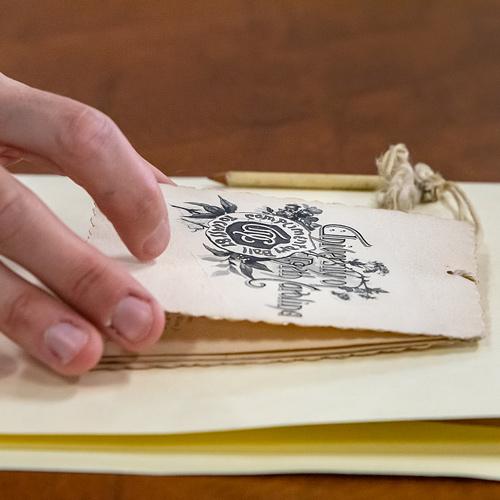 Students and faculty who want to make interactive maps, create professional websites, or use digital tools in the classroom have a new resource available: the department’s Digital History Lab (DHL). Housed in Hamilton Hall, the DHL offers both individual support and workshops to help students and faculty master new technologies.
Students and faculty who want to make interactive maps, create professional websites, or use digital tools in the classroom have a new resource available: the department’s Digital History Lab (DHL). Housed in Hamilton Hall, the DHL offers both individual support and workshops to help students and faculty master new technologies.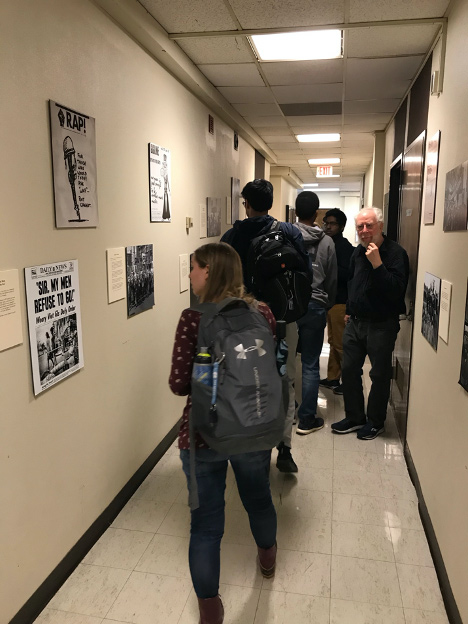 In the early weeks of the Spring 2020 semester, department students, staff, and faculty on the fifth floor of Hamilton Hall stepped into the past. Visitors were not ushered into a classroom or issued a stack of books to read. Instead, for four weeks between January 15 and February 15, the department’s corridors provided a temporary home for a traveling exhibition about anti-war protests during the Vietnam Era. The exhibit, a project connected to a 2019 book entitled Waging Peace in Vietnam: U.S. Soldiers and Veterans who Opposed the War, was edited and curated by Ron Carver, David Cortright, Barbara Doherty to commemorate the sometimes forgotten stories of U.S. soldiers who opposed the war. For those who lived through the period, the “Waging Peace in Vietnam” exhibit stirred memories of a polarizing moment when social values shifted, trust in public institutions waned, and many aspects of daily life became an exercise in negotiating opposing political camps. Today’s students, who have only second- or third-hand knowledge of the Vietnam Era, learned about unknown aspects of anti-war protests within the U.S. armed forces, particularly the networks formed through underground newspapers, posters, flyers, and photographs.
In the early weeks of the Spring 2020 semester, department students, staff, and faculty on the fifth floor of Hamilton Hall stepped into the past. Visitors were not ushered into a classroom or issued a stack of books to read. Instead, for four weeks between January 15 and February 15, the department’s corridors provided a temporary home for a traveling exhibition about anti-war protests during the Vietnam Era. The exhibit, a project connected to a 2019 book entitled Waging Peace in Vietnam: U.S. Soldiers and Veterans who Opposed the War, was edited and curated by Ron Carver, David Cortright, Barbara Doherty to commemorate the sometimes forgotten stories of U.S. soldiers who opposed the war. For those who lived through the period, the “Waging Peace in Vietnam” exhibit stirred memories of a polarizing moment when social values shifted, trust in public institutions waned, and many aspects of daily life became an exercise in negotiating opposing political camps. Today’s students, who have only second- or third-hand knowledge of the Vietnam Era, learned about unknown aspects of anti-war protests within the U.S. armed forces, particularly the networks formed through underground newspapers, posters, flyers, and photographs.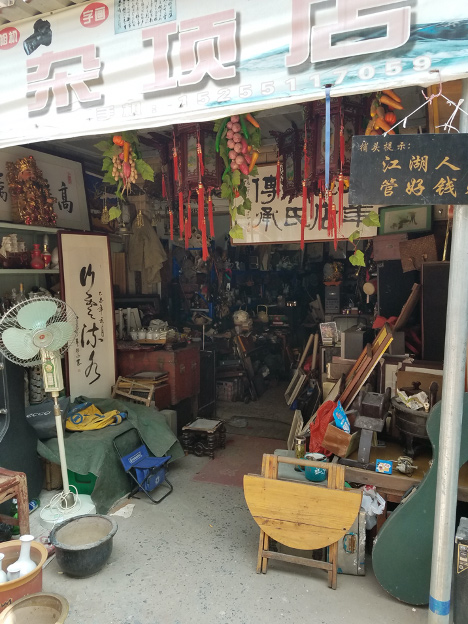 Pursuing a PhD in history is a demanding, long-term commitment. Graduate students balance rigorous reading requirements with language learning, research, teaching, grading, grant applications, and personal and family commitments. Faculty support, access to financial resources, and interconnected systems of area studies centers provide the Department’s outstanding PhD students with the tools they need to excel.
Pursuing a PhD in history is a demanding, long-term commitment. Graduate students balance rigorous reading requirements with language learning, research, teaching, grading, grant applications, and personal and family commitments. Faculty support, access to financial resources, and interconnected systems of area studies centers provide the Department’s outstanding PhD students with the tools they need to excel.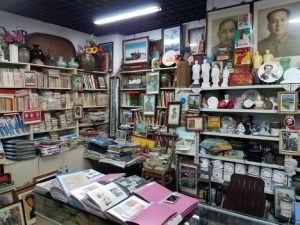 Even after completing their dissertation research, graduate students continue benefit from the Department’s support for project completion and post-graduation employment. Allison Somogyi, PhD ’19, is currently finishing a one-year postdoctoral fellowship jointly supported by Yale and the University of Southern California. In her position, Somogyi has broadened her dissertation research, which gives voice to female survivors of sexual violence during and after the Holocaust. Like Santacaterina, Somogyi attributes her academic success to the Department’s ability to connect students to able mentors and much-needed funds. Advisor Chad Bryant and co-mentor Karen Auerbach smoothed Somogyi’s transition from United States to European history. Research support provided through the Saul Kagan Fellowship in Advanced Shoah Studies and the Conference on Jewish Material Claims Against Germany allowed Somogyi to pull together sources from archives in Hungary, Israel, and Washington, D.C., and a dissertation completion grant permitted her to focus her final year in the program on writing and securing her current postdoctoral position. In recent months, Somogyi has seen her tireless work at UNC come to fruition. Most notably, she was presented with the Dean’s Distinguished Dissertation Award, given annually to the most innovative, sophisticated, and original dissertation completed within each field of study. Meanwhile, Somogyi has assisted Yale and USC archivists with digitizing many of the more than 40,000 documents related to Holocaust survivors’ testimonies housed at the two institutions.
Even after completing their dissertation research, graduate students continue benefit from the Department’s support for project completion and post-graduation employment. Allison Somogyi, PhD ’19, is currently finishing a one-year postdoctoral fellowship jointly supported by Yale and the University of Southern California. In her position, Somogyi has broadened her dissertation research, which gives voice to female survivors of sexual violence during and after the Holocaust. Like Santacaterina, Somogyi attributes her academic success to the Department’s ability to connect students to able mentors and much-needed funds. Advisor Chad Bryant and co-mentor Karen Auerbach smoothed Somogyi’s transition from United States to European history. Research support provided through the Saul Kagan Fellowship in Advanced Shoah Studies and the Conference on Jewish Material Claims Against Germany allowed Somogyi to pull together sources from archives in Hungary, Israel, and Washington, D.C., and a dissertation completion grant permitted her to focus her final year in the program on writing and securing her current postdoctoral position. In recent months, Somogyi has seen her tireless work at UNC come to fruition. Most notably, she was presented with the Dean’s Distinguished Dissertation Award, given annually to the most innovative, sophisticated, and original dissertation completed within each field of study. Meanwhile, Somogyi has assisted Yale and USC archivists with digitizing many of the more than 40,000 documents related to Holocaust survivors’ testimonies housed at the two institutions.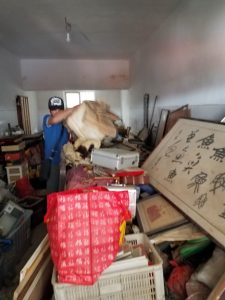 Both Santacaterina and Somogyi noted their gratitude to the Department, while stressing the vital need for donors and alumni to continue their support of current and future history graduate students. The COVID-19 crisis, which has thrown a wrench into the hopes and plans of many PhD students, makes that need all the more acute. Somogyi’s fellowship, for example, will not be available next year because of budget restraints partially connected to the COVID-19 crisis. Santacaterina is negotiating travel restrictions enacted by funders that jeopardize his ability to collect the materials required for his project. For research to continue during and after the current economic downturn, graduate students at UNC will continue to rely on generous contributions to support travel and allow them to track down sources and write groundbreaking new scholarship.
Both Santacaterina and Somogyi noted their gratitude to the Department, while stressing the vital need for donors and alumni to continue their support of current and future history graduate students. The COVID-19 crisis, which has thrown a wrench into the hopes and plans of many PhD students, makes that need all the more acute. Somogyi’s fellowship, for example, will not be available next year because of budget restraints partially connected to the COVID-19 crisis. Santacaterina is negotiating travel restrictions enacted by funders that jeopardize his ability to collect the materials required for his project. For research to continue during and after the current economic downturn, graduate students at UNC will continue to rely on generous contributions to support travel and allow them to track down sources and write groundbreaking new scholarship.